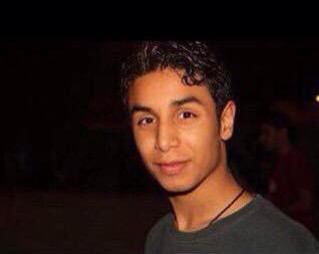Ali-Mohammed al-Nimr: Juvenile prisoner speaks out ahead of death sentence
Ali Mohammed al-Nimr: 'I will get out. And if I die, I've lived a happy life.'

A 21-year-old prisoner in Saudi Arabia, who faces death by execution for participating in anti-government demonstrations has spoken out about his death sentence. Ali Mohammed al-Nimr was arrested on 14 February 2012 when he was just 17, during a crackdown on anti-government protests in the Shiite province of Qatif. Following a "bogus confession" and a flawed judicial process he was sentenced to death.
The then high school student's alleged "crimes" were that he attended the protest, taught first aid to demonstrators, incited others to join the protest and he was alleged to be in possession of a gun. Ali and his family have strongly denied the charges against him, but, after a final appeal to have the sentence commuted was dismissed, it is feared that he could be executed in a matter of days.
I will get out. And if I die, I've lived a happy life.
Without an immediate and urgent intervention the 21-year-old will be publicly beheaded, crucified and his body will be 'displayed' in the open air for three days.
Demonstrating untold courage and stoicism in the face of such evident injustice, speaking from his prison cell, Ali has reportedly told his family he "has not lost hope." According to Mail Online a source close to his family revealed, that as he faces certain death, he told them: "I will get out. And if I die, I've lived a happy life."
The source explained: "'He was so optimistic. He wasn't scared. Even after he was given the death penalty, he never showed any fear. The last time I spoke to him, he told me he was going to get out and continue his studies. He doesn't think about the death penalty or prison or the miserable life he has now – he just tries to get through to the next day. Otherwise he said he'd be broken all day, just thinking about death. But if he thinks about the future, he's going to live a happy life and he knows that."
The source added that Ali's parents are 'broken' as they are forced to contemplate the impending death of their son and their life without him. "They feel sad, they feel hopeless - helpless. They lie awake at night thinking about how he's doing in prison, wondering if he is thinking about the death penalty. His father is a very strong man but I can feel that he's not acting normal any more - he is broken. And his mother loves him so much. She says forget about it, don't worry, but I can see that she is worried a lot. They are going to kill their child - nobody can handle that."
His younger siblings, having no understanding of the tragic fate he faces, hug a portrait of him; they miss their older brother and wait for him to come home.

The case against Ali appears to be an act of revenge against his activist uncle, Sheikh Nimr al-Nimr, a 53-year-old critic of the Saudi regime and a prominent religious leader in the Kingdom. Mr Al Nimr was sentenced to death by crucifixion on charges including 'insulting the King' and delivering religious sermons that 'disrupt national unity'.
Imposing the death penalty on children violates the UN Convention on the Rights of the Child and the death sentence passed when Ali was legally considered a child, has been met with global condemnation. France and the United Nations have ordered Saudi Arabia not to carry out the brutal execution. In the UK, newly appointed Labour party leader Jeremy Corbyn has urged Prime Minister David Cameron to intervene. Britain's Ministry of Justice has been urged to withdraw its bid to provide 'services' to the Saudi prison system unless the sentence is dismissed.
Human rights organisations have claimed that the sentence is also unlawful since the final appeal against his execution took place in secret and without his knowledge and evidence presented was not made available to his lawyers.
The Saudi government's plans to "crucify" Ali al-Nimr are nothing short of an outrage. He was imprisoned, tortured into a bogus "confession", denied access to a lawyer and sentenced to death by crucifixion.
United Nations experts on arbitrary executions, torture and child rights have called on Saudi Arabia to halt the execution citing that 'confessions obtained under torture cannot be used as evidence'.
Highlighting Saudi Arabia's rising numbers of execution in a joint statement, the experts said: "Such a surge in executions in the country makes Saudi Arabia a sad exception in a world where States are increasingly moving away from the death penalty. Al-Nimr did not receive a fair trial and his lawyer was not allowed to properly assist him and was prevented from accessing the case file. We call upon the Saudi authorities to ensure a fair retrial of Ali Mohammed al-Nimr, and to immediately halt the scheduled execution."
Maya Foa, head of the death penalty team at Reprieve, told MailOnline: "The Saudi government's plans to "crucify" Ali al-Nimr are nothing short of an outrage. He was imprisoned, tortured into a bogus "confession", denied access to a lawyer and sentenced to death by crucifixion."
A Change.org petition calling for a halt to the crucifixion has gained 12,000 signatures, Another petition by human rights group Reprieve has nearly 14,000 and a petition urging the UK's government to put pressure on the Saudis has garnered around 3,500 signatures. A Facebook page has been created to rally support in protest at the death sentence on Ali Mohammed al-Nimr.
According to Amnesty International Saudi Arabia has one of the highest execution rates in the world, with only China and Iran carrying out more judicial killings. 134 people have been executed so far this year, 44 more than the total for the whole of 2014.
© Copyright IBTimes 2025. All rights reserved.




















